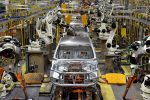
UAW Plans to Expand Agenda Targeting Toyota, Tesla, and Other Non-Union Automakers
The United Auto Workers (UAW) are embarking on an ambitious campaign to expand their influence beyond the Detroit Three automakers, signaling their intent to organize workers at nonunion auto factories, including Toyota and Tesla. This move comes in the wake of the UAW’s recent success in securing favorable contracts with the Detroit Three, including Stellantis, General Motors, and Ford. UAW leadership aims to capitalize on these successes and leverage the record wage increases achieved in these agreements to attract workers at other automakers.
The UAW’s organizing director, Brian O. Shepherd, highlighted Toyota’s recent decision to increase wages for U.S. workers by 9% and reduce the time it takes new hires to reach the top pay rate as a potential incentive for Toyota workers to join the #StandUpUAW campaign. Additionally, other foreign automakers, such as Honda, are closely monitoring the recent wage hikes negotiated by the UAW with the Detroit Three, indicating their commitment to remaining competitive in the market.
UAW President Shawn Fain has made it clear that the union’s goal is to organize nonunion auto workers like never before. Fain envisions expanding negotiations beyond the Big Three to include other automakers, aiming for the “Big Five or Big Six” at the bargaining table in the future.
Workers at nonunion auto factories in the southern United States have shown interest in joining the UAW, with an increasing number of inquiries pouring in. This includes calls from Toyota’s Georgetown, Kentucky, assembly operation, which is located near one of the UAW’s major local unions representing Ford plants.
Tim Smith, UAW Region 8 director, emphasized the importance of considering total wages and benefits rather than just the wage rate, assuring potential members that the UAW is there to educate and support them. The challenge for the UAW in organizing nonunion auto factories lies in right-to-work labor laws in many southern U.S. states, which make it optional for workers to pay union dues.
Despite past attempts, the UAW has struggled to gain a foothold in nonunion auto factories, including Tesla’s Fremont, California, plant. Elon Musk, Tesla’s CEO, had publicly discouraged unionization in the past, leading to a complaint filed with the National Labor Relations Board (NLRB). The NLRB ruled that Musk’s tweet violated labor laws prohibiting management threats against workers supporting unionization.
While the UAW’s organizing efforts between 2015 and 2020 were hampered by a federal investigation into corruption within the union’s leadership, President Shawn Fain has committed to implementing substantial reforms.
Nonunion automakers have historically kept hourly wages in line with UAW rates at the Detroit Three but maintained lower overall labor costs by offering reduced health and retirement benefits and employing more temporary workers at lower pay rates. This results in average hourly labor costs at foreign automakers being estimated at $55 per hour, compared to the $64 per hour under the old UAW contracts. Tesla’s U.S. labor costs are estimated at $45 to $50.
With the proposed increases in pay for veteran workers and temporary workers in the new contracts with the Detroit Three, the cost gap between UAW-represented workers and nonunion auto workers is expected to widen, adding complexity to the UAW’s organizing efforts.

